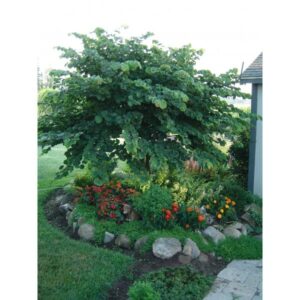Showing the single result
Wholesale Redbud Trees in Michigan For Sale
Based in Michigan, Cold Stream Farm supplies retail and wholesale redbud trees for orders across the United States. Our redbud trees are for sale at different heights, with plants above 4 feet typically only available in spring. Currently, there are no restrictions on redbud tree orders, so please contact us if you have any questions about available quantities or shipping considerations.
Our Redbud Trees (Cercis canadensis)
Cold Stream Farm sells Cercis canadensis trees, which are native to the eastern United States and Mexico. The species has many common names including redbud, eastern redbud, and the Judas-tree. We grow and sell live redbud transplants, available in several life stages.
How to Spot a Redbud Tree
Redbud trees can be found in the wild as far west as Texas and Nebraska, spanning east to Pennsylvania down to northern Florida. The tree can be immediately recognized if flowers are in bloom. The spring flowers are bright pink and magenta, covering the branches in bold clusters.
Size and Spread of an Eastern Redbud Tree
Mature redbud trees typically reach about 30 feet in height, with an equal spread from its long, blossoming branches. Redbud trees have a short and twisted trunk that supports the thin, zig-zagging extensions.
The Colors of an Eastern Redbud
Cercis canadensis gets the nickname “redbud” for its tiny, dark-red buds that appear in the winter. The “red” buds can also be chestnut in color. Similarly, the bark of a redbud tree is reddish-brown, as is the wood within the trunk and branches.
Of course, the redbud plant is most recognized for its pink, lavender flowers, which are technically a shade of red as well. These bright blossoms dominate the tree when in bloom, which generally occurs in the spring before the leaves grow back.
Emerging from the “redbuds” themselves, the leaves of a redbud tree are green throughout the summer, before turning bright yellow in the fall.
Best Growing Conditions for Redbud Trees
Redbud trees (Cercis canadensis) are not very picky about their living conditions. The plants tolerate full sun and partial shade in a variety of soil conditions. Ideally, redbud trees are grown in moist well-drained soil that is not in an area prone to pooling.
Growing best in the United States Department of Agriculture hardiness zones 4 to 9, redbud trees are very adaptive plants, able to survive in both rural and urban environments on residential, commercial, and public properties.
Birds and Wildlife
Humans aren’t the only species attracted to the bright pink flowers of an Eastern redbud. In fact, the blooms are pollinated by a few interesting, long-tongued honey bee species like carpenter and blueberry bees.
The plant is also a favorite among birds such as robins, cardinals, chickadees, and pheasants flying in for a snack on the tree’s seeds. On the ground, wildlife such as deer and squirrels also eat a few different parts of the redbud tree.
Human Uses for Redbud Trees
More than anything else, humans have been planting redbud trees to add dashes of color to any property throughout the seasons. The plants are easy to take care of and also attract wildlife, so what is not to like. Thanks to their stature, low-impact, and adaptability, redbuds are often planted in bunches to hide utility lines or other eyesores.
Human Consumption
Besides looking great, the flowers of a redbud tree are also edible. The pink blossoms can be eaten fresh off of the branch or fried before consumption. Redbud seeds can also be roasted, and have been studied to contain several medicinal benefits.
Both Native Americans and settlers throughout the Appalachian mountains have referred to redbud trees as “spicewood” trees, as twigs from the plant were often used when preparing wild game meat like opossum and venison.
Common Issues with Redbud Trees
Redbud trees are subject to infestation from a few different pests, with the most damage coming from moths and caterpillars. Although this may cause healthy trees to defoliate early in the fall, redbuds can generally withstand most pests without the need for fertilization or treatment.
How to Plant Cercis Canadensis
Redbud trees grow best in the midwest and east coast where there is enough rain to sustain the plant’s water demand. Planting redbud trees in Colorado and other arid regions is typically not worth it for the extensive watering that would be required. Redbud trees are best planted ornamentally on a lawn, garden, or landscape with enough room to grow and spread.
To get started on your order, please check the current stock of redbud trees in our online store. We have a limited supply of redbud trees at our facilities in Michigan, with the most availability for large quantities and other specific orders in the spring. Do not hesitate to reach out to Cold Stream Farm during normal business hours if you have any questions about purchasing wholesale or retail redbud trees.

